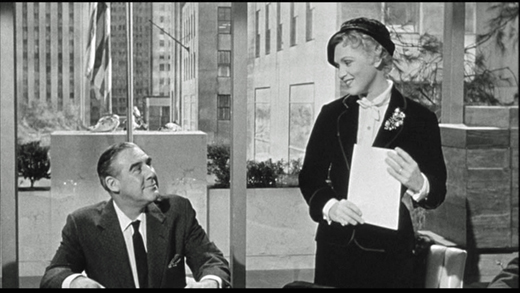The Solid Gold Cadillac
Richard Quine

Only one thing has changed about American corporations has changed since The Solid Gold Cadillac was released in 1956. Blue-bloods with old world charm no longer have easy access to directors' seats. I don't know that the change has been for the better, since the old-school WASPs have been replaced greedy sociopaths obsessed with quarterly earnings (or with any figure that can plausibly be presented as such). Otherwise, things are the same. Directors, who have the power to hire and fire management, or at least to fight about doing so, are elected in theory by shareholders but in practice by proxies. If you are a shareholder, you can, of course, attend the firm's obligatory annual meeting, but chances are that this will be a great and seemingly unnecessary inconvenience. So you tick off the delegation of your vote to a guy at the company, and votes your proxy. The guy is just probably pals with the CEO, and is likely to vote for the CEO's cronies. Very, very rarely, your ballot may offer you a choice of delegates, but Delaware law has been honed to make this extremely unusual. Thus the directors of most corporations are elected without anybody's paying much attention.
The Solid Gold Cadillac is a delightful fantasy that tweaks the proxy system to delightful effect. When Laura Partridge (Judy Holliday) inherits ten shares of International Projects, Ltd, she shows up at the annual meeting and gums up the proceedings with questions fiscal and parliamentary. A complete novice, she quickly learns that the directors are steamrolling the proceedings, and that the annual meeting is anything but an expression of democracy. She becomes so annoying that the head of the company, John T Blessington (John Williams in a bad-guy role), hires Laura and puts her in charge of small-shareholder relations. Blessington and his merry band of raptors, Alfred Metcalf (Ray Collins), Warren Gillie (Ralph Dumke), and Clifford Snell (Fred Clark) don't mean for their new executive to do anything, of course, and Amelia Shotgraven (Neva Patterson), Laura's secretary, is given instructions to see that Laura's desk stays clear. Needless to say, Blessington's bright idea backfires.
International Projects is in just about every line of industry, but it is heavily dependent upon government contracts. The cozy relationship between Washington and 30 Rockefeller Center (where IP's head office is located) is broken when IP's founder, Edward L McKeever (Paul Douglas) accepts a presidential appointment and scrupulously deflects contracts elsewhere. This makes Blessington & Co boiling mad, or at least a little bit nuts, for their new bright idea is to doll Laura up and send her down to Washington as a sort of Delilah. This idea backfires, too, when the newspapers get wind that McKeever and his girlfriend were traipsing back and forth between hotel rooms. But appearances are deceiving: Laura and McKeever aren't lovers - yet.
By now, Laura Partridge has long since risked dying of boredom, and she has persuaded Amelia and the office manager, Mark Jenkins (Arthur O'Connell), to provide her with a list of shareholders. She begins writing letters to little old ladies, and the little old ladies write back. These letters are purely sociable; IP is rarely discussed, although one writer is counseled to buy ten more shares so that she will have as much stock as her sister-in-law, who otherwise, Laura opines, will be impossible. When the big boys find learn about Laura's postage, they try to fire Amelia for insubordination, but Laura puts a stop to that with blackmail: from one writer, she has learned of a rather dark secret in the company's bosom. This is what she sits up all night talking to McKeever about. Outraged (the secret is a McGuffin, so its particulars needn't concern us here), McKeever decides to wrest control of IP from his former colleagues. A lawsuit, however, goes spectacularly wrong, and things look bad for McKeever. Then Laura remembers her bags of mail.
The climax of The Solid Gold Cadillac is a sort of corporate car-chase. While the directors try to ram through their self-serving motions at the annual meeting, Laura, McKeever, Amelia and Mark are closeted away counting proxies. For, guess what! All those little old shareholders have exercised their right to write in a delegate, and they've all chosen Laura Partridge. The moment when McKeever finally bursts into the meeting with the giant shopping basket full of proxies, to announce that Laura has all the proxies is one of the most rapturous in film. The film, shot in black and white, ends with a Technicolor moment: George Burns (who has narrated throughout the film - a great use of this device) announces that IP's grateful shareholders have purchased their favorite corporate office a "solid gold" Cadillac, and Mr and Mrs McKeever (as they've become) drive off, if not into the sunset, then at least the length of Rockefeller Plaza.
The Solid Gold Cadillac is a lovely romantic comedy. It's not quite a screwball, but Laura and McKeever do start out on a rocky patch, and watching Paul Douglas warm to Judy Holliday (and warm up himself in the process) is lovely. But I've left all of that out of this account, which is aimed to suggest that you can learn a lot about why large corporations are so easily governed by gangsters from a fifty year-old movie. The screenplay, based on a play by George S Kaufman, was written by Abe Burrows, and directed by Richard Quine. Check it out on IMDb. (June 2005)
Copyright (c) 2009 Pourover Press